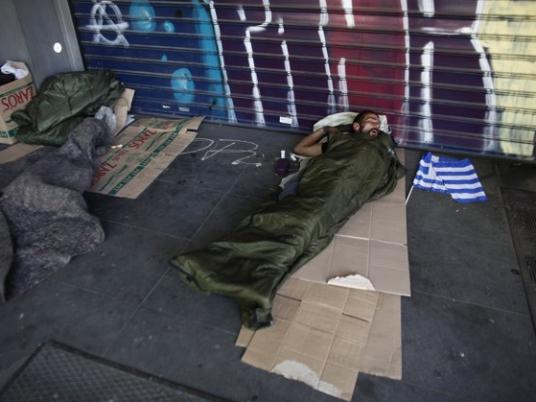
ATHENS — Greek voters enraged by economic hardship deserted traditional governing parties in droves at elections on Sunday, putting the country's future in the eurozone at risk, according to an early projection by the interior ministry.
The projection, confirming a pattern in earlier exit polls, showed the two parties supporting an EU/IMF bailout that is keeping Greece from bankruptcy would struggle to form a workable coalition government.
It was based on a representative sample from about 12 percent of polling stations across the country and showed conservative New Democracy and Socialist PASOK, who have dominated Greece for decades, being harshly punished by voters and reaching a maximum of less than 33 percent of the vote.
That would at best give them one seat above a parliamentary majority, seen as far too fragile to last.
Once mighty PASOK looked set to be pushed into third place by the anti-bailout Left Coalition Party, in a stunning vote against austerity policies that have caused deep hardship in one of Europe's worst postwar recessions.
The projection had New Democracy on 19.2 percent, Left Coalition on 16.3 and PASOK on a humiliating 13.6. In the previous election in 2009 PASOK, won a landslide victory with 44 percent and the Left Coalition had 5 percent.
"I cannot take it anymore, living as beggars in our own country. The Left Coalition can shake them up, and wake them up," said Kate Savvidou, 65, a pensioner who deserted PASOK.
In another indication of the extent of public anger, the extreme right Golden Dawn Party was shown taking an unprecedented 7 percent of the vote. This would allow such a party to enter parliament for the first time since the fall of a military dictatorship in 1974.
Early official results, based on 15 percent of returns, showed New Democracy with 21 percent, Left Coalition on 15.2 and PASOK with 14.7 percent.
PASOK leader Evangelos Venizelos said his party had paid the price for its handling of the economic crisis and called for a pro-bailout national unity government.
Analysts say the anti-bailout parties, coming from both the hard left and right, were extremely unlikely to unite even though they may be able to muster a parliamentary majority.
If the results are confirmed, the election could plunge Greece into new political turmoil, reigniting a eurozone debt crisis first detonated by Athens in 2009 and starting it down a path that could take it out of the euro.
Fragmentation
Several analysts said the unprecedented fragmentation of the vote could force another election.
"If exit polls prove to be true we are looking at days or weeks of instability and uncertainty. We might well have a repeat election," said Blanka Kolenikova of IHS Global Insight.
"This election was supposed to punish major parties and if they didn't manage to get a majority it was a punishment vote indeed," she said.
A New Democracy source said the party would not ask for repeat elections if it finished up as the largest party.
"I voted for Left Coalition, even if this means elections again in a month. I feel vindicated, things are changing little by little because people decided to speak up," said 22-year old student Klelia Avgerinopoulou.
The exit polls showed Greeks fuming at record unemployment, collapsing businesses and steep wage cuts had ignored warnings that a vote against the harsh terms of the bailout would push Greece towards bankruptcy.
"The exit polls confirm what has been patently clear for some time: There's no political consensus for the kind of reforms that Greece must implement if it wants to remain in the eurozone," said Nicholas Spiros of Spiro Sovereign Strategy.
Othon Anastasakis, director of southeast European studies at Oxford University told Reuters: "Greeks are sending a very strong message abroad, which is enough with austerity."
Many Greeks expressed their rage as they voted at the parties who accepted the harsh conditions of two bailouts that have kept the country from bankruptcy.
"My vote was a protest vote because they cut my pension and there are more measures waiting for us around the corner," said 75-year-old pensioner Kalliopi, her fists clenched in anger.
"I live in a basement but pay the same [property] tax as someone who lives in a penthouse," said Kalliopi after voting.
Threats ignored
International lenders and investors fear success for the small parties opposed to the bailout could lead to Greece reneging on the harsh terms for the program, risking a hard sovereign default and dragging the eurozone back into the worst crisis since its creation.
Eurozone paymaster Germany has warned there would be "consequences" to an anti-bailout vote and the EU and IMF insist whoever wins the election must stick to austerity if they want to receive the aid that keeps Greece afloat.
But many voters shrugged off such threats and Socialist Francois Hollande's victory in France's presidential election may have boosted chances of a broad pushback against German-led austerity in Europe.
"I don't think that voting for a small party will make us go bankrupt. We already are," said 53-year-old Panagiotis, a craftsman, after voting for the conservative Independent Greeks.
Greece faces an acid test as soon as next month when it must give parliamentary approval for over 11 billion euros in extra spending cuts for 2013 and 2014 in exchange for more EU/IMF aid.
That looks like a tough task even if a new government can be formed in time, given the success of anti-bailout parties.
Under the constitution, Greek President Karolos Papoulias will give the biggest party after the election three days to form a government. If it fails, the next largest group gets a chance and so on down the line. If they all fail, new polls would be called in about three weeks.




